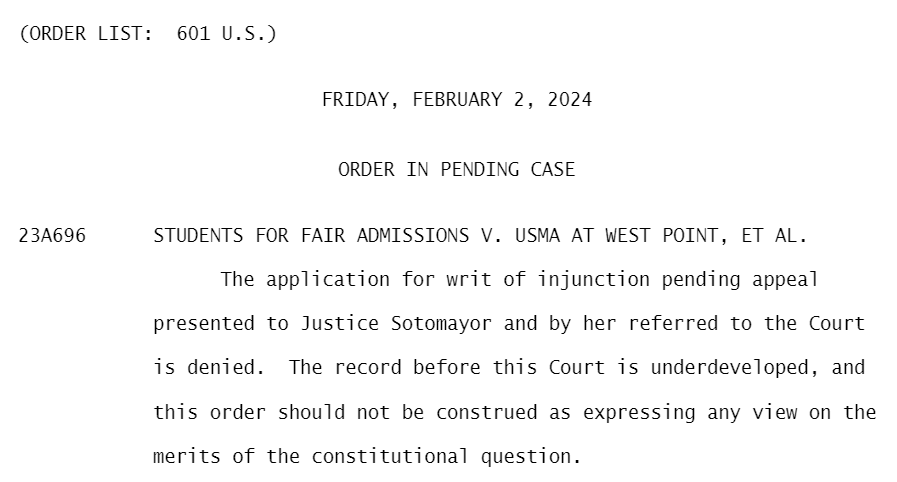2024-02-02 15:04:23
As our Jim Nault has written about previously, the District Court Judge in a case by Students for Fair Admissions — which successfully sued Harvard and UNC — denied an injunction to stop West Point from discriminating in admissions. In the Harvard opinion, the Supreme Court had noted that its decision did not address the military academies.
SFFA sought emergency injunctions pending appeal in both the Second Circuit (denied) and the U.S. Supreme Court. From the SCOTUS Emergency Application:
After this Court’s landmark decision in SFFA v. Harvard, no public or private university is openly considering race in admissions, with one exception: our nation’s military academies. The government read Harvard and decided that, for the upcoming class of 2028, the academies would “‘use race as a factor.’” D.Ct.Dkt.1 at 20 ¶75. Harvard “does not address” the military academies, 600 U.S. 181, 213 n.4 (2023), and the government reads that language as a “carve out [for] the military academies from [the] decision,” D.Ct.Dkt.47 at 63 n.30.
Far from a carveout, Harvard “does not address” the military academies because this Court didn’t know how they used race. 600 U.S. at 213 n.4. But the opinion says plenty about the law that governs them. The academies must satisfy real strict scrutiny: The lesson of Korematsu is that even the military must satisfy “‘the most rigid scrutiny’” when it racially classifies citizens, id. at 207 n.3, and this Court will not defer to the government’s assertions of military necessity, like its insistence that civilian universities needed to use race to preserve the diversity of ROTC, id. at 37980 (Sotomayor, J., dissenting). To satisfy strict scrutiny, the academies must identify “distinct interests”: They can no longer rely on the educational benefits that Harvard rejects. Id. at 213 n.4, 214-15 (majority). And even if the academies have distinct interests, they must prove narrow tailoring: They cannot use race as a negative, lack an endpoint, stereotype, deploy arbitrary categories, or pursue interests that courts can’t reliably measure. Id. at 213-25, 230. 2
Our Nation’s oldest military academy, West Point, finally revealed how it uses race below; and the facts are egregious. In response to SFFA’s motion for a preliminary injunction, West Point submitted over 300 pages about its admissions process. Even under its own telling, West Point is violating Harvard worse than Harvard itself. While Harvard denied that “some races are not eligible to receive a tip,” id. at 348 n.27 (Sotomayor, J., dissenting), West Point awards preferences to only three races: blacks, Hispanics, and Native Americans. Worse, in a throwback to Bakke and Gratz, West Point uses race to determine which office reviews applications, how many early offers it makes, and what scores applicants need to get. West Point concedes that it uses the same racial categories that Harvard deemed “‘incoherent,’” id. at 216 (majority), and that it has no firmer endpoint for its race-based admissions. And its asserted interests would have courts try to measure whether racial preferences are necessary to make the Army “lethal” on the battlefield or “legitimate” in the eyes of foreign countries. Even less amenable to judicial review.
For now, the only question is what should happen as this case proceeds—who should bear the burden of the status quo. Every year this case languishes in discovery, trial, or appeals, West Point will label and sort thousands more applicants based on their skin color—including the class of 2028, which West Point will start choosing in earnest once the application deadline closes on January 31. Should these young Americans bear the burden of West Point’s unchecked racial discrimination? Or should West Point bear the burden of temporarily complying with the Constitution’s command of racial equality? The answer, as Judge Sutton once explained in a similar 3 case, “turns on the likelihood of success on the merits.” Coal. to Defend Affirmative Action v. Granholm, 473 F.3d 237, 252 (6th Cir. 2006) (cleaned up). And here, West Point is highly likely to lose.
“Eliminating racial discrimination means eliminating all of it.” Harvard, 600 U.S. at 206. This Court should enjoin respondents from using the fact of an applicant’s race as a factor in making admissions decisions, pending the Second Circuit’s final disposition of SFFA’s appeal. See Akina v. Hawaii, 577 U.S. 1024 (2015); Final Judgment (Doc. 754), SFFA v. Harvard, No. 14-cv-14176 (D. Mass. Jan. 9, 2024). To accommodate West Point’s main concerns, this Court should rule by January 31, 2024 (or as soon as possible after that date). This Court could also clarify that its injunction is prospective, meaning it does not require West Point to rescind any offers of admission made before it was entered. Cf. Andino v. Middleton, 141 S.Ct. 9, 10 (2020).*
From West Point’s Opposition:
For more than forty years, our Nation’s military leaders have determined that a diverse Army officer corps is a national-security imperative and that achieving that diversity requires limited consideration of race in selecting those who join the Army as cadets at the United States Military Academy at West Point. Last year, 2 in rejecting the consideration of race in the admissions policies employed by some civilian colleges, this Court acknowledged those longstanding military practices and emphasized that its decision “d[id] not address” the “propriety of race-based admissions systems” at “our Nation’s military academies” because of “the potentially distinct interests that military academies may present.” Students for Fair Admissions, Inc. v. President & Fellows of Harvard Coll., 600 U.S. 181, 213 n.4 (2023) (Harvard).
Applicant Students for Fair Admissions (SFFA) now asks this Court to issue an extraordinary injunction requiring West Point to jettison admissions procedures that the Army has deemed a military imperative for generations. SFFA attempts to justify that drastic alteration of the status quo by invoking a purported emergency that will occur after January 31, when SFFA asserts “West Point will start” evaluating applications for the class of 2028 in earnest. Appl. 26; see Appl. 2. But West Point has been reviewing applications since August 2023 and will continue doing so through April or May 2024. It has already issued offers to hundreds of candidates, representing a substantial portion of the appointments available for the class of 2028. The only thing that will happen on January 31 is that the time to apply in this cycle will close — but SFFA does not explain why that deadline has any relevance to the two individual members it represents in this suit.
The district court correctly held that SFFA has not satisfied 3 any of the requirements for upending the status quo at this early stage of the litigation, which is only four months old. And SFFA certainly has not met the far higher standard for securing from this Court interim injunctive relief that the lower courts have declined to grant.
The Supreme Court just denied the injunction pending appeal:
The application for writ of injunction pending appeal presented to Justice Sotomayor and by her referred to the Court is denied. The record before this Court is underdeveloped, and this order should not be construed as expressing any view on the merits of the constitutional question.
Donations tax deductible
to the full extent allowed by law.








